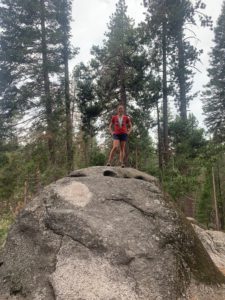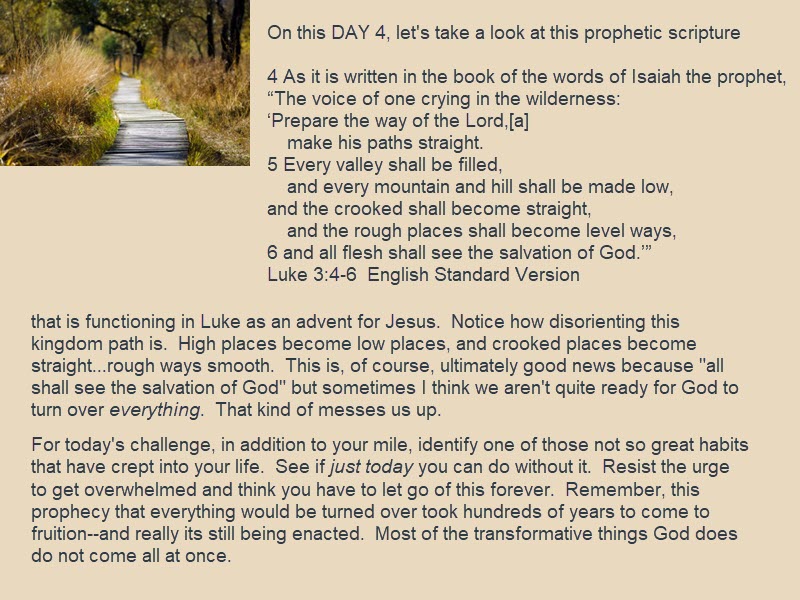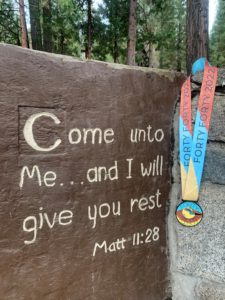As a Christian school we at OC Online regularly take time to observe and discern our witness. In other words: we think a lot about what we are being known for, and if what we’re known for brings our and others’ attention to Jesus and Jesus’s concerns. Many Christian organizations talk about this like “being salt and light” or providing a “reason for this hope we have” or other comparable aspirations.
More recently we, as an online community, have been sensing a strong gospel tug to stand firm in the areas of sustainability, rhythm, and compassion and to actively resist frenetic busyness and bottomless achievement. The Judeo-Christian tradition has a long history of practicing this counter-cultural way of life and Jesus spent plenty of time practicing this and inspiring others to live in this way.
Today, however, we find ourselves challenged with our witness, asking questions like:
- How do biblical practices like Sabbath and the Year of Jubilee inform our organization? How do we bring shalom and grace into our workplace?
- What sacrifices do we need to make to numerical or financial growth in order to preserve authentic relationships and genuine love among our people?
- How do we stay committed to excellence without making compromises to spiritual, emotional, and physical wellbeing?
We don’t have perfect answers to these questions. We do, however, have efforts:
- Sustainability Management is now an agenda item on every weekly staff meeting.
- Teacher Burnout was addressed at three faculty meetings this past year.
- Compassion Hour launched in Spring ’22. Teachers were able to choose how to utilize school funds to complete a research based refueling practice; we launched this as part of a compassion symposium that focused on extending compassion to students.
- Authentic Assessments were implemented in over 75% of our courses in order to replace ‘high stakes’ final exams.
We really want to make sure that we aren’t just ‘paying lip service’ to care, compassion, and sustainability, but can visibly see these values in practice.
Over the summer, we’ve looked for ways to take this even further. To share a bit about this, we interviewed three faculty/staff members (Lita, Janell, and Christine) to offer their experience of these organizational practices of balance, sustainability, and resistance.
Balance: Building a Culture of Invitation
One of the most valuable efforts we’ve made over the years to preserve balance in our midst is to intentionally use the term “invitation”—and really mean it. Students can join in for movie nights, lunch gatherings, baking nights, 5ks and many other activities—or not. Likewise, faculty are invited to take on additional professional and spiritual development opportunities or decide they need a break. Behind these decisions is trust: we believe our students and faculty can make good decisions when provided with these options and we want to empower them in their discernment. Too often organizations create calendars that make individuals feel at risk of losing social capital if they do not participate. In our case we want to work towards community more than conformity and that means everyone being allowed to make real choices about how to grow.
What this effort looked like this summer was some teachers decided not to work at all and to come to a full stop. Still others wanted to continue with a full teaching load while others wanted to also not teach but still participate in the formational opportunities we have for faculty. We had teachers everywhere on the spectrum—which makes us proud not embarrassed.
Janell says, “It has been a while since I have taken off a summer without doing some sort of professional development or research, but after a challenging couple of years, both in my career and in my family, I recognized that my stress levels were reaching an all-time high. Cumulative stress is an interesting beast as we normalize it over and over and miss the fact that it might be time for some restoration and healing. Science and nature are how I connect and identify with God. Surrounded by trees is my happy place, so this summer [my husband who is also a teacher here] and I are making a 6000 + mile road trip around the United States.”
 Christine says, “[During summer] I’m not worried about the “I should” that occupies my mind during the school year. It can be as simple as walking around the neighborhood, finding a new spot to sit and reflect, or watching the flowers grow. We kicked off summer 2022 with a trip to Ireland and Northern Ireland. We sandwiched this trip with reading preparation as a family: short stories, legends, poetry, and a modern history of Ireland and Northern Ireland. Upon our return stateside, I became mom chauffeur – to museums, beaches, and sports camps. While it was busy, it was a shift in focus, as I tried to be intentional about our family discussions. For example, we selected museums based on personal interests, which is an advantage of living near a major city. A visit to the beach involves discussing the beauty of Creation and the importance of caring for it. Sports camps remind us to try our best and support our teammates. A break from the normal routine can feel unsettling at first, but it can also an opportunity to rest from the calendar.”
Christine says, “[During summer] I’m not worried about the “I should” that occupies my mind during the school year. It can be as simple as walking around the neighborhood, finding a new spot to sit and reflect, or watching the flowers grow. We kicked off summer 2022 with a trip to Ireland and Northern Ireland. We sandwiched this trip with reading preparation as a family: short stories, legends, poetry, and a modern history of Ireland and Northern Ireland. Upon our return stateside, I became mom chauffeur – to museums, beaches, and sports camps. While it was busy, it was a shift in focus, as I tried to be intentional about our family discussions. For example, we selected museums based on personal interests, which is an advantage of living near a major city. A visit to the beach involves discussing the beauty of Creation and the importance of caring for it. Sports camps remind us to try our best and support our teammates. A break from the normal routine can feel unsettling at first, but it can also an opportunity to rest from the calendar.”
Lita says, “I am teaching this summer and am loving the variety of the daily summer devotionals in the faculty lounge because you get some worship, some scripture, and some practical tasks. At the same time, I’m also learning how important it is to have permission to skip, especially during this season. I really take advantage of time off on Fridays; I stack my workdays so that I have three-day weekends during the summer. We have a pool that I spend as much time as possible just floating and looking at the trees and that is my happy place right now; it is just the best.”
Sustainability: 40/40 Mile Challenge
Frankly, working online can be hard on the body over time. At a minimum, it can cause you to forget your body and lose sight of its importance. As we’ve shared elsewhere, we want to be an online program that values all of creation and nourishes the whole person—not just the mind.
To put this value into practice, we’ve been having so much fun completing a 40/40 challenge together! Teachers were invited to participate in a challenge to complete a mile of movement per day for forty days and then read a daily devotional and accept a daily faith challenge.
Lita says, “I learned about the 40/40 Challenge last spring, and I did another one that was really good. At that time, I only managed to do maybe half of it. But as someone who really struggles to get out, I’m learning to reframe and really see the accomplishments. When I got done with it, I realized, “that’s 20 miles that I did!” For this challenge, I love the list our chaplain sent out; in fact, I have it hanging over my desk. To have permission to look at the day and realize I might not have done a twenty-minute walk specifically, but I walked back and forth while I was doing the batch cooking, or I swam for half an hour, or whatever activity it is, because it’s really about different kinds of movement and being more intentional about getting that activity every day and that’s the thing I really needed most for myself.”
Janell says, “A big part of our trip is spending time outside, hiking, and enjoying nature. The 40/40 mile challenge seemed like a neat way to incorporate some intentional worship and reflection into that time. I also liked the aspect of sharing in this with fellow educators at Oaks Christian Online. One of the things I love most about nature is that when you look closely: everything is connected. I believe this aspect of creation helps us understand how important connection is to God and that He values our connections – to him, to his creation, and to each other. The 40/40 mile challenge is a way for me to intentionally work on all three of those connections. In particular, the day 4 devotional stood out to me as we were planning our summer trip.

As we laid out the path we would take, booked our hotels and campsites, and chose the fun places we wanted to stop, it struck me that I like to have a plan. But the devotional and the scriptures in Luke made me wonder if sometimes my plan isn’t the best one. Maybe my plans are short-sited or missing something really wonderful that God wants to give me. Allowing God to turn over everything is a challenge but one that I want to take on so that I can have God’s best for my life.”
 Christine says, “Whenever possible, I enjoy being in movement outside, especially with a change in scenery. I like walking, running, biking…but those are usually planned solo workouts. So, I decided to [use the 40/40 challenge to] pace it out with time of reflection and to involve my family. Our city has many open space trails. I challenged my family to visit all of the trails this summer. Sometimes they grumble, due to the early hour to avoid the SoCal heat. However, it has been a time to meander and look for crossing rabbits, buzzing bees, and scurrying insects. Most importantly, it has been a time of sharing whatever is on our minds or reflecting on the devotional topics.
Christine says, “Whenever possible, I enjoy being in movement outside, especially with a change in scenery. I like walking, running, biking…but those are usually planned solo workouts. So, I decided to [use the 40/40 challenge to] pace it out with time of reflection and to involve my family. Our city has many open space trails. I challenged my family to visit all of the trails this summer. Sometimes they grumble, due to the early hour to avoid the SoCal heat. However, it has been a time to meander and look for crossing rabbits, buzzing bees, and scurrying insects. Most importantly, it has been a time of sharing whatever is on our minds or reflecting on the devotional topics.
Resistance: Book Clubs
This summer we let our faculty choose if they would like to be in a book club together and if so which book(s) they would like to explore. Overwhelmingly, the faculty wanted to meet to cover two books: Wisdom of the Desert Fathers (July 11) and Margin (August 2). It’s important to note that both books speak (in very different ways) of the importance of discernment and wisdom in how we spend our days. Each is concerned with what happens to spiritual formation and to care of neighbors when we are unintentionally swept away with culture.
Thomas Merton, speaking of the desert mystics in the 4th, 5th, and 6th centuries who had serious concerns about the rising power and corruption of the first Christian empire says, “The simple men [and women] who lived their lives out to a good old age among the rocks and sands only did so because they had come into the desert to be themselves, their ordinary selves” (Wisdom of the Desert Fathers, 23). While the Christian empire was growing in an effort to become extraordinary, these iconic disciples resisted and retreated to an ordinary life with a focus on prayer, hospitality, and meekness.
Christine says, “I appreciate that the Desert Fathers (and Mothers) were willing to spend time working on their struggles. When you strip away other comforts which we can use as a shield, it can be easy to gloss over internal struggles. It may feel a bit extreme to put a pebble in your mouth for fourteen years to learn to watch your words, but it is admirable to recognize that some internal changes can be a slow and steady process.”
Meanwhile, some 1500 years later Margin identifies a similar prophetic plea but for a different reason, saying:
“We must have some room to breathe. We need freedom to think and permission to heal. Our relationships are being starved to death by velocity. No one has the time to listen, let alone love. Our children lay wounded on the ground, run over by our high-speed good intentions. Is God now pro-exhaustion?” (27)
Building margin into life is about creating actual room and space for the unexpected, for the stranger, for God’s interruptions and more.
Lita says: “I really live by my calendar and so I literally block [unstructured] time so that I don’t end up with meetings or other things encroaching. Very rarely something important will come up and I have to shift it, but it is blocked. I also block chunks of time to do different things like cooking or outdoor activities or meditation or Bible study time.”
Challenging Questions for your Organization
We started this blog with some of the bigger, overarching questions that have been driving our witness and some of the choices we’ve made; we continue to be in progress. Here are a few questions you might use to spur honest conversation about sustainability and balance with your team:
- What are the feelings and norms around taking time off in your workplace?
- What are three things your organization could say no to or cut out that would be life-giving for the employees?
- If an unexpected stranger in serious need approached your organization with a request—would there be time, money, energy, and people in reserves to respond to it?
- What does “growth” mean to your organization besides just “more”?
- If you are a school, is there time/space weekly or monthly for your staff and faculty to continue their education? If you are a Christian organization, is there time/space weekly or monthly for your staff to engage in personal (not professional) spiritual practices? If you are a Christian school—is there room for both?









